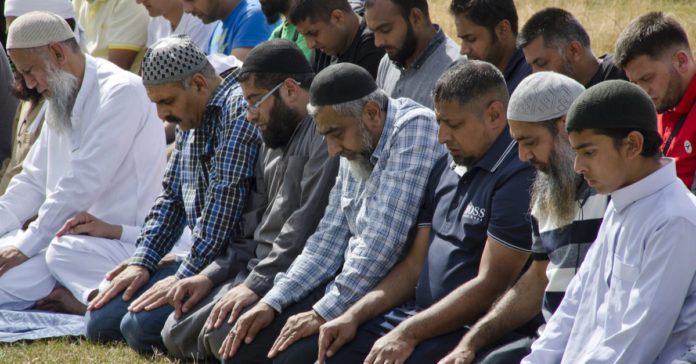Newly released census data shows that there are now 3.9 million Muslims in England and Wales – an increase of 1.2 million people over the last decade.
The data means that there are now around four million Muslims living in the UK if the Muslim populations of Scotland and Northern Ireland are taken into account.
The Office for National Statistics data shows that there were 3.9 million people who described themselves as “Muslim” in 2021, which equates to 6.5% of the population of England and Wales.
This is up from 2.7 million Muslims residing in England and Wales in 2011, which equated to 4.9% of the population.
London is the place with the highest concentration of Muslims. Fifteen per cent of Londoners describe themselves as Muslim – up from 12.6% in 2021. This means that there are over 1.3 million Muslims living in London alone.
As in 2011, the area with the highest percentage of the population who described themselves as “Muslim” was Tower Hamlets (39.9%, up from 38.0% in 2011). Other areas with high percentages of people responding as “Muslim” included Blackburn with Darwen (35.0%) and Newham (34.8%).
The census data on religion also clearly shows that England and Wales is becoming less Christian with more and more people abandoning religion altogether.
Subscribe to our newsletter and stay updated on the latest news and updates from around the Muslim world!
- Less than half of the population (46.2% or 27.5 million people) described themselves as “Christian” – a 13.1 percentage point decrease from 59.3% (33.3 million) in 2011.
- “No religion” was the second most common response, increasing by 12.0 percentage points to 37.2% (22.2 million) from 25.2% (14.1 million) in 2011.
- Wales had a greater decrease in people reporting their religion as “Christian” (14.0 percentage point decrease, from 57.6% in 2011 to 43.6% in 2021), and increase in “No religion” (14.5 percentage point increase, from 32.1% in 2011 to 46.5% in 2021).
- London remains the most religiously diverse region of England in 2021, with over a quarter (25.3%) of all usual residents reporting a religion other than “Christian.”
- The North East and South West are the least religiously diverse regions, with 4.2% and 3.2%, respectively, selecting a religion other than “Christian.”
- The number of Hindus living in England and Wales increased to 1.0 million which equates to 1.7% of the overall population in 2021. This was up from 818,000, 1.5% in 2011.
The census introduced a voluntary question on religion in 2001. In the census data, religion refers to a person’s religious affiliation. This is the religion with which they connect or identify, rather than their beliefs or active religious practice.
In total, 94.0% of the overall population in England and Wales (56.0 million people) chose to answer the religion question in 2021. This is a higher percentage than in 2011, when 92.9% (52.1 million) answered the religion question and 7.1% (4.0 million) chose not to answer.
The overall population of England and Wales is around 59 million people.
Commenting on the latest census data, Muslim Council of Britain Secretary General Zara Mohammed said: “While our nation has an increasingly ageing population, the contribution to the work force of a youthful Muslim population remains a strategic national asset. The last decade has seen more second and third generation Muslims, confident of our faith and place in society, contributing immensely to the economic recovery and vitality of our nation.”
“There are, of course, areas of concern, particularly where many Muslim communities disproportionately impacted by deprivation. There is especially worrying given the concern on access to opportunity and inclusion. Policy makers now need to address these concerns, communities cannot continue to be left in cycles of poor social mobility. Young people cannot have a bright future if they do not have the best opportunities available to them.
“These initial figures give us an opportunity to now make meaningful change and create a better Britain for all.”



















